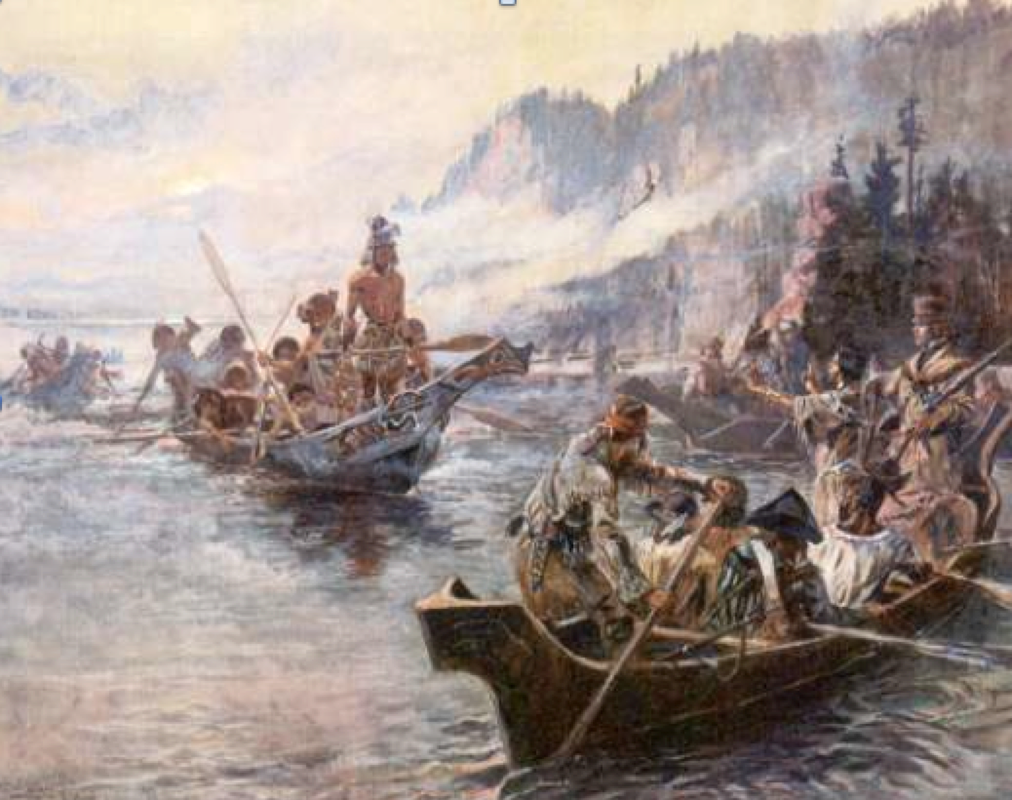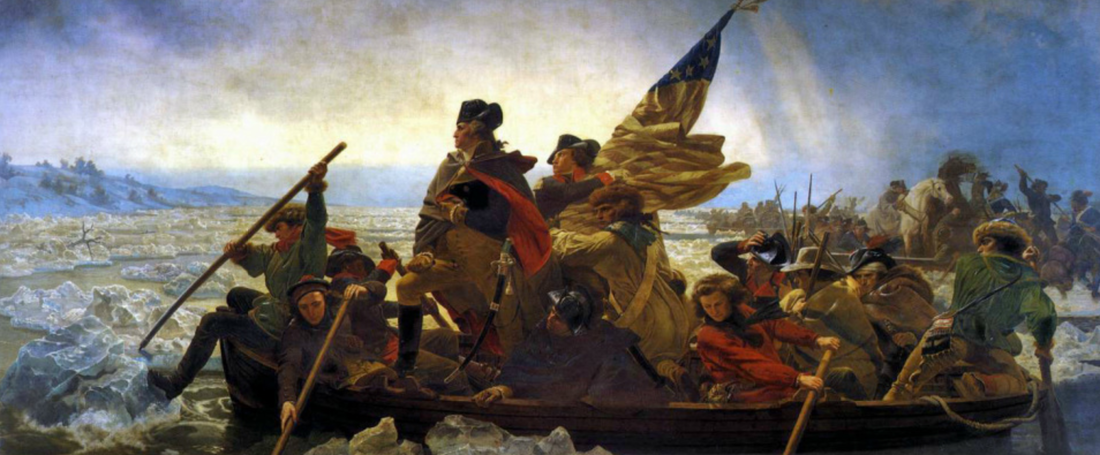Painting by Charles Marion Russell, 1905, Wikimedia Commons
There were many reasons to rejoice at that moment. They were the first to cross the continent through American territory to the crest of the Rockies. They accomplished the task without hostilities with any Native American peoples. They lost only one man during the crossing. They gathered valuable information about the flora , fauna, and geological features along the way. And then in a single moment their success was assured. Making the event even more wondrous, as if in confirmation of the kinship they had experienced on the crossing, the expedition members voted together on November 24, 1805, in deciding where to locate their winter camp. In this case the “they” was not only free white males, as was the customary electorate in the United States at that time, but it included the Indian woman Sacajawea and William Clark’s slave, York. In their moment of triumph, they set an example in democracy not known to the nation as a whole until more than a century later.
Reflecting on William Clark’s phrase, I have decided to compile a list of other “Oh! The Joy!” moments in American history, and herewith a preliminary list of qualifications:
2) The moment can, none the less, be the result of months , even years, of planning as long as the fruition of that planning comes in a single, epic event.
3) The moment should bring glad feelings. Other kinds of sudden developments may entail sorrow even tragedy, but they are certainly not “Oh! The Joy!” moments. One thinks, for example, of the events of September 11, 2001.
To explore this subject further, let’s look at another sublime moment in American history: George Washington’s crossing the Delaware.
Crossing the Delaware – Twice
Emmanuel Leutze, 1851, Wikimedia Commons
In retreat George Washington left behind in Manhattan several thousand American soldiers at Fort Washington, named of course for the general. He thought they could withstand any British assault. In a chapter on “The Continental Army in the Year of Independence” published in American Realities, I wrote this description:
Fort Washington, the last American stronghold on Manhattan, was on a high cliff over the Hudson, surrounded on all but the river side by the British. Washington believed that the position was indefensible but was persuaded by his subordinate, Nathanael Greene, that it could be held. On November 16 he watched in despair from the opposite shore as his fears were realized. The outer works of the fort were too extensive to be held by the 2,800 men left in Manhattan. They were easily overwhelmed, and the defenders retreated into the fort itself. But it was small and impossibly crowded, and at the day’s end the situation was hopeless, and the garrison surrendered. It was the worst defeat of Washington’s career. In addition to losing almost three thousand men, he lost guns, cannon, munitions, and supplies.
Additionally, the loss of Fort Washington was a uniquely personal loss for the general. The episode was not merely a news item he studied in a field report or a remote event on a battlefield he commanded. As the fort was overwhelmed, Washington was on the opposite side of the Hudson River, on the New Jersey Palisades, watching through a telescope. In painful detail he could see Americans overwhelmed, finally surrendering or falling to the sword. Following the losses of the previous months, this was simply too much. Washington turned away and began to weep, in the words of one historian, “with the tenderness of a child.” This was no weakness on the commander’s part; rather it indicates one of his strengths. Washington could care deeply, intimately, about his men, even while dealing with larger, impersonal questions of conducting the war.
“These are the times that try men’s souls.”
In desperation Washington conceived the bold plan of crossing the Delaware to attack a garrison at Trenton, manned by Hessians, British mercenaries. Again, from American Realities:
On the night of December 25 Washington began to prepare 2,400 men for the crossing of the Delaware. He had assembled a fleet of long, shallow-draft Durham boats, normally used as trading vessels… During the night the temperature dropped and the wind came howling down the valley. Snow fell on the small transports as they made the three-hundred-yard trip across the cold water between hard blocks of ice. But in the early morning of December 26 the army was across and marched over frozen roads to Trenton.
There they surprised the Hessian garrison, sleeping off a Christmas celebration. The enemy tried without success to organize themselves to fend off Washington’s attack, but they surrendered after forty-five minutes. It was a stunning victory. Washington captured a thousand enemy troops and their supplies at the cost of only twelve casualties.
Fearing a British counterattack, Washington took his men and their prisoners back across the Delaware. In a few days his soldiers would complete their one-year enlistments, but Washington persuaded most to stay another six weeks. On December 30 he recrossed the Delaware. This time the British were prepared. General Cornwallis was in the vicinity with six thousand troops. On the night of January 2 the British general camped his men near Washington’s position on Assumpink Creek. Expecting to attack Washington the next day, Cornwallis remarked, “At last we have run down the old fox and will bag him in the morning.”
But his prediction was wrong, for Washington once more eluded the British with a night march. Leaving a few men behind to tend the campfires, the Americans marched past Cornwallis deep into enemy-held territory. On the morning of January 3 they routed the British at Princeton, and Washington watched the retreat with childlike enthusiasm. Sitting astride his horse, he waved his sword and shouted, “It’s a fine fox chase, my boys.”
The victories at Trenton and Princeton gave an enormous boost to American morale. In Europe the New Jersey counterthrust was described by such eminent military experts as Frederick of Prussia as one of the great campaigns of the century. At home in New York, Lydia Minturn Post credited the American success to divine Providence; to “the judgment, skill, and intrepidity” of George Washington; and to the “deep-rooted indignation” of the Patriots who would “do and dare for liberty, or death.” Even an old English observer had to admit that Washington’s successes restored American confidence. “A few days ago,” he said, “they had given up their cause for lost. . . . Now they are all liberty mad again.”
View more entries on the American Realities blog...
(You know you want to!)



 RSS Feed
RSS Feed